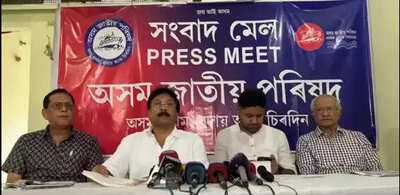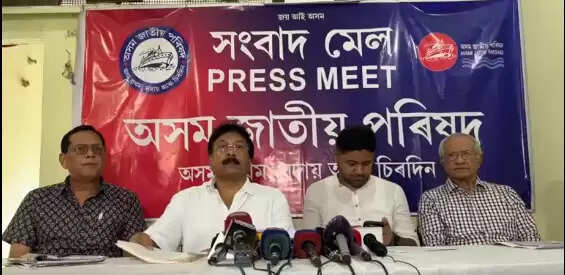
 AJP's Strong Opposition to Land Law Revisions
AJP's Strong Opposition to Land Law Revisions
Guwahati, June 29: The Assam Jatiya Parishad (AJP) has voiced strong opposition to the Assam government's current initiatives aimed at revising land laws. During a meeting held at the Pragjyoti ITA Centre in Machkhowa, the party accused the State government of acting independently and against the interests of the public. The gathering, titled “Land Problems and Solutions in Assam,” resulted in several resolutions calling for the government to cease what they termed a non-transparent and externally influenced reform process.
The AJP contended that the proposed amendments to Assam's land laws were being executed in a clandestine and arbitrary fashion, leaving citizens uninformed. They further asserted that these land policy reforms seemed to be motivated by external influences, threatening the rights of the indigenous populations in Assam. The party has demanded an extension of the public consultation period regarding the draft land governance framework by an additional six months.
“We have invited protesting organizations from across the State, where the government intends to seize land from people under various pretenses. We have thoroughly examined both the social and legal aspects of this issue. It is crucial to see through the facade surrounding these proposed changes. Together, we will raise a powerful voice to ensure that no injustice is inflicted upon the indigenous communities of Assam,” stated Lurinjyoti Gogoi, president of AJP.
The meeting also emphasized the need for the execution of recommendations made by two significant government-appointed committees - the Land Reforms Committee led by Harishankar Brahma and the high-level committee chaired by retired Justice Biplab Kumar Sharma.
Addressing the challenges faced by families affected by floods and erosion, the AJP called for a policy-driven approach to land allotment and resettlement for these displaced residents. Concerns were also raised regarding the effectiveness of the government’s flagship ‘Basundhara’ scheme, with allegations that it was being misused to dispossess individuals rather than assist them. A demand was made for the publication of a white paper outlining its implementation and results.
The AJP stressed the necessity for a land policy that prioritizes the rights of indigenous people while fostering sustainable development. A public committee, consisting of social leaders and experts, has been formed to draft a model land policy, which will be presented to the public shortly. This 15-member committee is chaired by Chandrakanta Das.
The proposed hydropower project on the Kulsi River was also scrutinized during the meeting, with demands for the government to provide comprehensive information regarding the technical and environmental impacts of the dam. Additionally, there were calls for thorough consultations with the communities affected and appointed experts.
The regional party reiterated its call for the complete implementation of the Forest Rights Act, 2006, to ensure land titles for Scheduled Tribes and traditional forest dwellers.
Through this meeting, the AJP aimed to galvanize public sentiment and institutional resistance against reforms they consider undemocratic and detrimental to the populace.